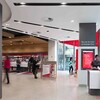The manufacturing process in the UAE flat glass market involves creating large flat sheets using techniques including float glass. It is basically where molten glass floats on a metal surface to form a uniform sheet with superior clarity. Glass can subsequently undergo additional treatments including cutting and coating to meet particular requirements.
The UAE flat glass market with its excellent transparency is a crucial material in sectors like building or automotive. The construction sector significantly relies on flat glass for producing windows and facades in residential or commercial buildings. With its ability to provide natural light and enhance energy efficiency through features like insulated glass the market is growing significantly.
Flat glass is popular for car windshields and sunroofs in automotive. In the electronics sector it is essential for display screens in devices like smartphones and TVs. That is because it provides clarity and touch responsiveness. It is also likely to be a vital material in future technologies. The increasing focus on energy efficiency will drive its use in smart windows or solar panels. Innovations in coatings and treatments will also enhance flat glass functionality by enabling it to become self cleaning and generate energy. The automotive sector will also benefit from innovations in flat glass with lightweight materials becoming vital for electric vehicle advancements. The flat glass application in augmented reality devices or smart home systems is also likely to expand its potential in the coming years.
The Applications
The UAE flat glass market size is expanding rapidly as it witnesses numerous applications in various sectors. It is a crucial material in modern architecture with applications in commercial and residential buildings. Advances in flat glass production are further unlocking new applications in electronics particularly in TV or phone screens. Further progress in flat glass technology can result in more sustainable building practices.
- Building sector
Flat glass is generally useful for smaller windows in residential homes. Meanwhile larger windows are particularly constructed using toughened glass. Glass in windows fulfills aesthetic or functional roles. This basically allows occupants to enjoy the view while permitting light to shine through.
- Commercial glazing
Flat glass is becoming a more common choice in commercial settings. This basically enables buildings to be constructed while offering the feeling of being outdoors. There is also an additional benefit to protecting from environmental elements aside from the sun.
Glass is gaining popularity in building exteriors because it offers a visually appealing and low maintenance exterior surface. That is important to note that many glasses for this purpose generally undergo a post heat toughening procedure prior to use. In a time when there is a growing focus on sustainable practices within the office and at home it is particularly essential to consider the materials in constructing big commercial buildings.
This application generally involves multiple design factors with aesthetics being just one consideration. Factors like light or heat transmittance are important in glass selection. That is because they basically determine the cooling and heating requirements within a building based on seasonal or climatic differences. Controlling heating and cooling more efficiently in a building can significantly have a profound effect on reducing its environmental footprint and operational costs.
- Displays
Owing to its transparency along with easy maintenance it is a popular choice for display cases in many retail outlets. But toughened glass is becoming the preferred choice for many applications owing to its better strength.



